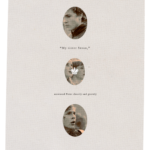Ahhhhh okay I will. I’ve been keeping it in a Google doc, and… wow it got long. Apologies for messy words or scattered thoughts; here it is.
.
.
Alright, I love Susan. And I love the Chronicles of Narnia. But you have to understand where C.S. Lewis is coming from. He wrote the Chronicles of Narnia as a metaphor for Christianity, for trusting in God and learning to follow Him and trusting in His rules.
What does any of this have to do with Susan, you ask? Isn’t he condemning womanhood, female beauty, being an adult in the world and growing up and moving away from “childish things?” After all, Aslan says to find him in their own world. I’m going to argue that none of this is truly what C.S. Lewis is saying. Please keep in mind that it has been a few years since I read the full series, so exact references might slip past or be misremembered- I’ll depend on the Narnia Wiki and the New American Standard Bible for reference.
Let’s look at the metaphor of Christianity more closely. Aslan, the unblemished sacrifice, lion and lamb, lays down his life for the sinner who knew what was right and turned against him anyways. Four rulers, for the four Gospels of the bible. The longing to be in Heaven, in union with God (Aslan).
So these three children and Susan, they leave Heaven as adults and revert to children in “the real world.” And for awhile, all four of them commiserate the lose of Narnia. And when they next visit, Peter and Susan are told they won’t return.
And Susan gives up on Narnia. She appears to decide that all of what happened in Narnia is only there, stops trying to find Aslan in the “real world,” and becomes a woman of the world. In this, the handful of Narnian humans seem to condemn her.
Alternately, Peter, Susan, and Edmund grow into childhood. They remember Aslan, and they talk about him and find others who know Aslan, and communicate and exchange views and theories about Narnia and the creation of the world of Narnia itself. The world that was sullied by the temptation of the White Witch, and if you remember, it’s Christmas that the children miss when they learn of her eternal winter. The birth of Christ that would bring the spring.
The adults who are children, seventeen year old Lucy and her older and more mature brothers, the Professor and Polly and Jill, all adult and old enough to wear makeup and dresses and suits and call on lovers. these children stay true to Narnia. They remember it, they search for Aslan in their world and find it in each other and the good of others. And then they die and go to Narnia, but it’s so much better than they ever experienced before, and everyone who died in their adventures are there, and they can see their parents on the shores of England- because it turns out Narnia was never actually as far away from them in their home as they thought it was.
And you think that Susan wasn’t there because she was a grown up feminine woman. Susan who grows up and strives to be adult, beautiful, female and desired. None of which is condemned by Aslan. However, Susan in that form could not enter the Narnia-Heaven the others came to at the end of The Last Battle. Why? Most obviously, because Susan wasn’t on the train.
A grown up woman of 21, you say she was? A grown up woman, whose parents couldn’t put on a train and send off with her siblings. Eustace, Peter, Lucy, Edmund, Jill, the Professor, and Polly were the ones killed in the crash- the five hit by the train, and the Professor and Polly actually riding it. They were going to meet. They were going to discuss Narnia.
They were childish. These seven adults, gathering to discuss a childish thing, something they were supposed to have left behind. But if you refer to the Gospel of Matthew, chapter 18 verses 1-6, you get this exchange between Jesus and the disciples:
At that time the disciples came to Jesus and said, “Who then is greatest in the kingdom of heaven?” 2 And He called a child to Himself and set him before them, 3 and said, “Truly I say to you, unless you are converted and become like children, you will not enter the kingdom of heaven. 4 Whoever then humbles himself as this child, he is the greatest in the kingdom of heaven. 5 And whoever receives one such child in My name receives Me; 6 but whoever causes one of these little ones who believe in Me to stumble, it would be better for him to have a heavy millstone hung around his neck, and to be drowned in the depth of the sea.
Jesus asks His disciples to love as freely and as deeply as little children do, something which many people struggle with. If you have ever been loved by a small child, you know exactly the kind of love this is. What was it the Pevensie siblings, Polly, the Professor himself were? Childish? Susan went out into the world and left Narnia behind; she stopped searching for Aslan in her world at all, because she decided he didn’t exist. And there was her second mistake.
In St. Paul’s letter to the Romans (in the book of the Bible aptly named “Romans”), chapter 12, verse 2, he states: “And do not be conformed to this world, but be transformed by the renewing of your mind, so that you may prove what the will of God is, that which is good and acceptable and perfect.”
This is a verse that is tossed around a lot and confuses a lot of people. Being in the world is unavoidable: this is the world, and we all share it, everyone who has lived and everyone who will live. However, not being “conformed to this world, but be transformed by the renewing of your mind” is a bit harder. This verse is often bandied about as “be in the world, but not of it” and seems, again, to condemn the world we live in. However, that’s not quite what it means.
Humanity is physical, we live on Earth and we are born and live and die. This is being in the world. But not being “of” the world means that one should not live for it, with only earthly things as a goal. There’s life after death, so the church says, and we should prepare for it through our life on earth.
There’s a lot to say on this topic, and I’ve filled three pages of a Google document already; I promise you that I could fill more. But in all honesty Susan didn’t go to Narnia-heaven because she wasn’t dead. Maybe at that time in her life her unbelief saved her; maybe the fact that she wasn’t on the train to discuss something she didn’t believe was Aslan’s way of giving her more time to realize that Narnia was still a real and important aspect of her life. Or maybe she grows bitter and old after the deaths of so many loved ones, and never revisits Narnia.
We can’t know; her story was left as it was intentionally. But that’s my take on Susan and her faith, on the nylons and lipstick and beaus and how none of that, ultimately, was the reason for her siblings’ biting words or the seeming condemnation that is her unfinished story.

Just another WordPress site

